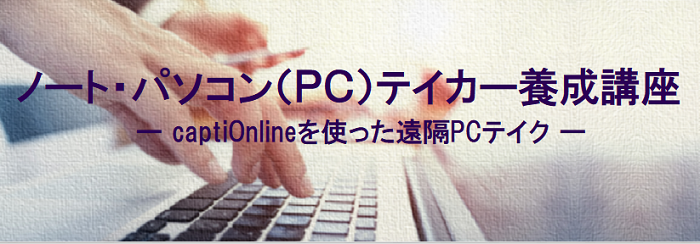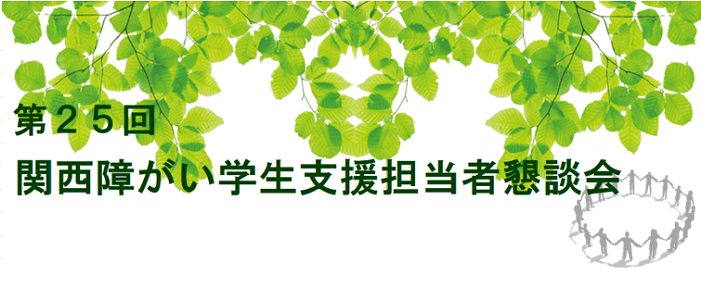The report of this course held on Friday, August 21 is posted.
Find out more here!
Notebook and PC Taker Training Course -Remote PC Take Using captiOnline-
Archives
Dissemination of a Joint Message by the University Consortium Kyoto and Kyoto City
We are pleased to announce that the University Consortium Kyoto (48 universities, including all universities and junior colleges in Kyoto City) and Kyoto City
At the start of the second semester of classes at universities and other institutions, we have decided to jointly send out a message of support for students who are anxious due to the coronavirus pandemic.
This message is intended to be disseminated by the university and the government as one by deepening discussions at the “University Town Kyoto Summer Meeting” (*) and other events in order to support students who are living student life in Kyoto even during the coronavirus pandemic as a whole as a city.
* A meeting between the presidents of Kyoto member universities and the mayor of Kyoto
↓↓↓Click to see a PDF of the message. ↓↓↓
【For Students】10/10 (Sat) “TOEFL iBT® Test Skill Improvement Online Seminar”
accession“TOEFL iBT Test Skill Improvement Online Seminar” (free) for university students!
CIEE, the TOEFL test office of Japan, and the University Consortium Kyoto will hold a preparatory seminar by ETS-certified trainers for university students who are considering taking the TOEFL iBT test (limited to students belonging to member universities of the University Consortium Kyoto).
This seminar will be held as a seminar for beginners, so if you are thinking of taking the TOEFL test to study abroad in the future, or if you want to know how to study for the TOEFL and how to prepare, please join us.
This year, the event will be held online using Zoom, so you can participate from home!
Participation is free.
The final deadline for applications is Monday, October 5, but please note that the deadline will be as soon as the capacity is reached.
* We received a large number of applications that exceeded the capacity.
The registration for this seminar was closed at 2 p.m. on Wednesday, September 23.
The TOEFL test is the most widely accepted English language test in the world, and more than 9,000 institutions in 130 countries, including almost all universities in the United States, the United Kingdom, Australia, New Zealand, and Canada, use TOEFL test scores as proof of English proficiency, admission, recommendation, scholarships, and graduation.
In addition, more than 30 million people around the world have taken the test so far, making it an indispensable test for students who aspire to study abroad. In Japan, it is used as a guide for internal credit recognition at educational institutions, preferential treatment for entrance examinations, and selection for overseas dispatch.
Click here for seminar outline → TOEFL iBT Test Seminar Flyer
|
Date & Time: |
Saturday, October 10, 2020 10:00~12:30 (Zoom entry starts at 9:45~) |
|
Venue: |
Please prepare an Internet environment that can access the online course and a computer with a camera and microphone function, and access it from a convenient location. |
|
Target: |
Students enrolled in a member university of the University Consortium Kyoto who fall under the following categories: ・Those who are just starting to study for the TOEFL iBT test or those who have recently started ・ Those who have taken exams and want to know how to study effectively |
|
Capacity: |
50 people (first-come, first-served basis) → due to popular demand, the number of participants will be expanded! * Please note that if there are a large number of applications, it will be closed as soon as the capacity is reached. |
|
Lecturer: |
ETS Certified Trainer Chiaki Taoka (Lecturer, Kobe Jogakuin University ) |
|
Contents: |
– Preparation of Reading, Listening, Speaking, and Writing sections ・How to study for the TOEFL iBT test ・Introduction of TOEFL iBT test-specific questions and teaching materials *Lectures will be conducted in Japanese. |
Co-organizers: University Consortium Kyoto / CIEE International Educational Exchange Council
Inquiries
[TOEFL®テスト日本事務局]
CIEE International Educational Exchange Council www.toefl–ibt.jp/test_takers/
Email: seminar■cieej.or.jp (Please change ■ to @)
Outline of the presentation in Kyoto in English
Why don’t you actually experience the traditional culture of Japan and learn the know-how to give a presentation about Kyoto and Japan in English so that you can introduce Kyoto and Japan culture in English when people from overseas ask you, “What kind of country is Japan?”
You are planning to study abroad, are interested in studying abroad, or want to explain Kyoto and Japan to people overseas in Japan… Mr./Ms., please join us!
*Those who wish to complete this training will be appointed by Kyoto City to become “Kyoto PR Student Ambassadors” who will promote the charms of Kyoto to the world during their study abroad periods.
~~Outline of “Presentation on Kyoto in English” ~~
A total of six half-day training sessions will be held to learn English expressions about Kyoto’s tourist attractions and the traditional culture of Kyoto and Japan.
〈Training day (6 sessions in total)〉
Method: Online training using Zoom (some face-to-face training) Time: 13:30~17:00 (with breaks)
1. Saturday, October 17, 2020: [Online] (1) Ice Break, Introduction to Japan and Kyoto ~ About Japan and Kyoto in English
Learn ~ (2) Learn expressions that explain traditional Japan culture in English
2. Saturday, October 24, 2020: [Face-to-face] Traditional Culture: Hands-on experience of tea ceremony and flower arrangement
3. Saturday, October 31, 2020: [Online] (1) Mini presentation in English (2) Discussion with international students
4. Saturday, November 14, 2020: [Online] Learn about Kyoto’s famous places, events, souvenirs, etc.
5. Saturday, November 21, 2020: [Online] Learn about food, clothing, housing, education, etc. in Japan and Kyoto
6. Saturday, November 28, 2020: [Online] Personal Presentation
◎ Eligibility: All of the following conditions must be met.
1. Be a student at a member university or junior college of the University Consortium Kyoto
(It does not matter what course you are enrolled in (undergraduate, master’s, or doctoral program))
2. Ability to participate in all training sessions
3. Your English score must be one of the following:
IELTS 5.0 / TOEFL iBT 63 / TOEIC 650 or higher
4. Interested in international exchange and cross-cultural understanding
5. You must have access to the Internet and a computer with a camera and microphone function that can access the online training.
◎ Capacity: about 20 people
◎ Fee: 2,500 yen (total amount for all 6 sessions, including reference materials and actual expenses for exercises)
* Please pay in cash (as little change as possible) on Saturday, October 24th.
*Please bear your own expenses and transportation expenses related to online classes.
◎ Application period: September 2, 2020 (Wednesday) ~ September 30, 2020 (Wednesday) 12:00
* If there are a large number of applicants, we will notify you by e-mail by Saturday, October 3 after a lottery.
◎ Application guidelines:
Please apply using this application form.
We look forward to hearing from you!
◎ Notes:
Please note that in light of the social situation regarding self-restraint in events to prevent the spread of new coronavirus infections, this project may be canceled (or postponed) or the content may be changed even at the last minute.
“University Town Kyoto, Student Town Kyoto” Official App KYO-DENT
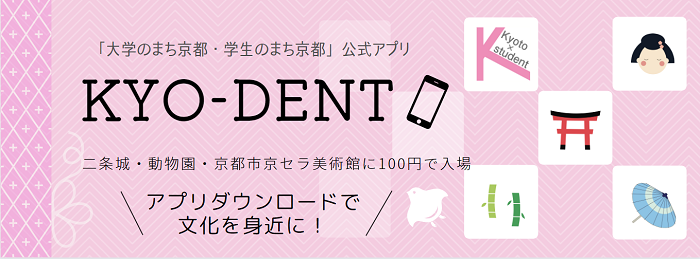 Kyoto students themselves have developed an app for students to live a fulfilling student life in Kyoto!
Kyoto students themselves have developed an app for students to live a fulfilling student life in Kyoto!
I want to change myself and find something new during my student life in Kyoto. I want to know a world that I don’t know …….
KYO-DENT is an app for students in Kyoto.
▶ Click here for the “KYO-DENT” flyer
You can use the Kyoto City Campus Cultural Partners System!
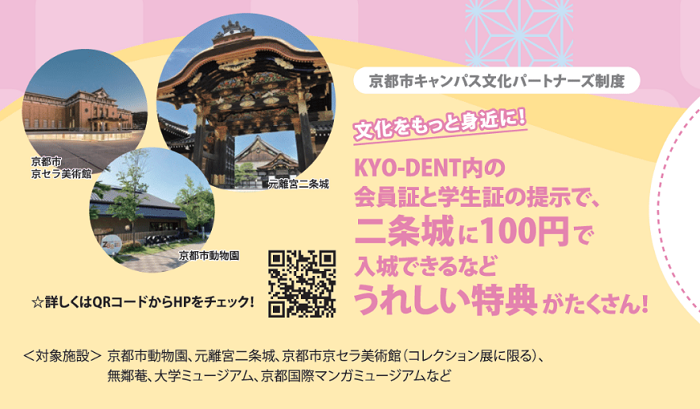
◆ In Kyoto City, in order to deepen students’ understanding of culture and art and enrich student life by providing students with an environment where they can become familiar with culture and art, and by providing opportunities to build contacts with the local community through participation in cultural and artistic activities, the “Kyoto City Campus Cultural Partners System” has been implemented since the 22nd academic year. We have set up.
◆ By presenting your in-app membership card and student ID, you can enter Nijo Castle, Kyoto City Kyocera Museum of Art, and Kyoto City Zoo for 100 yen.
◆Click here for details on the Kyoto City Campus Cultural Partners System and target facilities.
Mr./Ms. more! What you can do with KYO-DENT
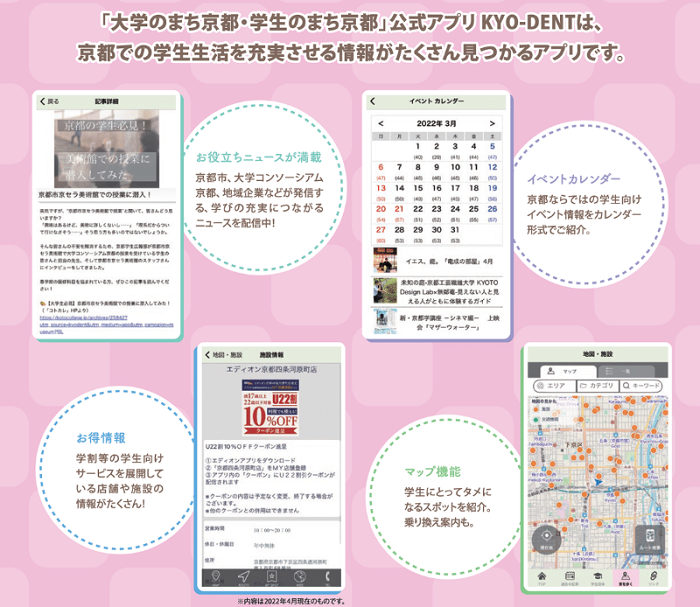 ◆ News
◆ News
Kyoto City, University Consortium Kyoto, local companies, etc., deliver news for students that will lead to the enrichment of learning!
◆ Event Calendar
Distributing event information for students unique to Kyoto in calendar format!
◆ Deals
Information on stores and facilities that offer student discounts and other services for students is distributed on the map and by category!
◆ Map function
Introducing spots that are a good place for students. Transfer information is also available.
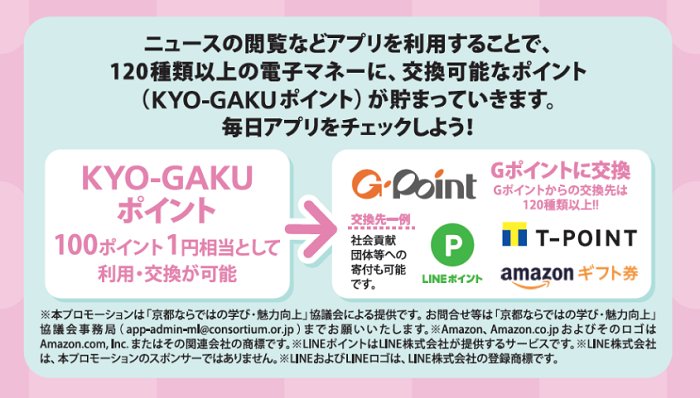
◆ Points
By using the app to read articles, you can accumulate points that can be exchanged for your favorite electronic money (more than 120 types in total)!
◆ Kyo Mebae
As you log in to the app and use the app, the “sprouts” of Kyoto vegetables will grow, and you will earn points in the app by harvesting Kyoto vegetables!
Download it here!
Click here to see the passion of the students involved in the development of KYO-DENT!
▶ Click here for the development
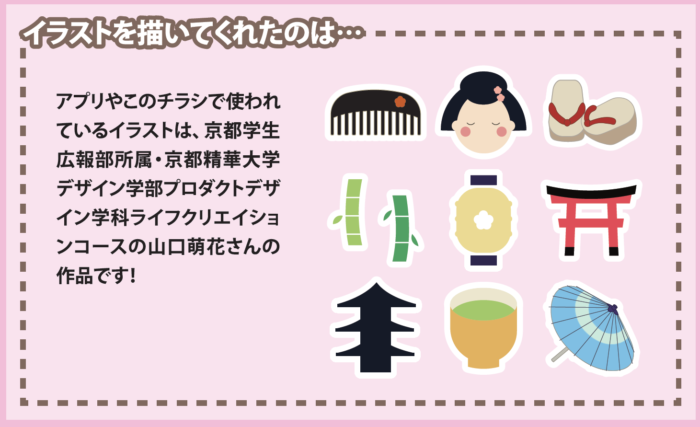
Inquiries
“Improving the Attractiveness of Learning and Attractiveness Unique to Kyoto” Council Secretariat
Kyoto City Planning Bureau, Policy Office, University Policy / Research and Public Relations Department, University Consortium Kyoto
TEL:075-222-3103/075-353-9130
FAX:075-222-2902/075-353-9101
MAIL: app-admin-ml■consortium.or.jp (Please change ■ to @)
Extension of the opening period of the study space at Campus Plaza Kyoto
In order to support students’ learning, Kyoto City and the University Consortium Kyoto have collaborated to open a learning space equipped with a Wi-Fi environment and other facilities at Kyoto City University’s Town Exchange Center (nickname: Campus Plaza Kyoto) from June 9 to August 31, Reiwa 2 as part of the “Project for Creating an Environment for Student Learning.”
We would like to inform you that we will be extending the opening period of the learning space after reviewing some operations.
Please note that the following changes will be made after September 1st.
・The location is Campus Plaza Kyoto 6th floor, 6th Lecture Room, and 20 seats are available per section.
・The time zone of the usage classification will change.
Morning (9:00~12:40), Afternoon (13:00~17:40), Evening (18:00~21:00)
・Laptops are not available for rent. (Printers are available)
・ The management staff will not be stationed in the rental room at all times, but will patrol each time. As a general rule, please use it at the user’s own management.
* Please be sure to bring items that can confirm your eligibility (student ID, etc.) and seat reservation details (smartphone screen, etc.) as the management staff may check them.
< Attached> Extension of the opening period of the study space at Campus Plaza Kyoto
【For Faculty and Staff】Briefing Session on Employment Support Projects for International Students (Information)
The International Student Study Kyoto Network (Secretariat: University Consortium Kyoto) will hold the “Employment Support Project Information Session for International Students” as follows.
In this briefing session, we will introduce employment support projects for international students implemented by public institutions in Kyoto, and will also hold an opinion exchange meeting to share the issues of participants, taking up “online job hunting for international students” and “startup visa program” as topics to provide.
Please use this as an opportunity to share information about our efforts to support the employment of international students and to build a network of international student supporters.
We look forward to your participation.
record
Date & Time: Friday, September 18, 2020 (Reiwa 2) 14:00~16:30 (Reception 13:45~)
Format: Online (using Zoom)
Target: Faculty and staff of universities, junior colleges, vocational schools, and Japan schools in Kyoto
(Faculty and staff who are involved in or interested in supporting the employment of international students)
Capacity: 30 people (application on a first-come, first-served basis, deadline as soon as capacity is reached)
Contents: Provision of topics, introduction of employment support projects, exchange of opinions
Admission: Free
How to apply: Please apply by either the application form or e-mail.
(1) Application form: https://forms.gle/vwaCKdmjP3KQCcuz7
(2) For applications by e-mail, the title is “Application for participation in the 2020 Employment Support Project Briefing Session for International Students”.
Please fill in the following items (1) ~ (5) and send it to the secretariat [kyoto-nw@consortium.or.jp].
(1) Name of participant (multiple people can apply, individual sign-in is required for participation)
(2) Affiliation (name of school) (3) Department/Position (4) Issues and opinions regarding employment support for international students at your university
(5) Whether or not you wish to exchange business cards online
(* The personal information received will be used only for the purpose of the operation of the Society.) )
Contact Us:
International Student Study Kyoto Network (Secretariat: International Affairs Department, University Consortium Kyoto)
TEL:075-353-9164 FAX:075-353-9101
E-mail:kyoto-nw@consortium.or.jp
【For High School Teachers】”The 7th Kyoto High School Teacher Exchange Meeting” October 10 (Sat) Call for Participants
The “Kyoto High School Teacher Exchange Meeting” is a place where people who transcend the boundaries of schools and their founders can share their ideas and concerns about school and homeroom management, class improvement, etc., and interact with each other to solve problems.
We are pleased to announce that the 7th meeting will be held as follows.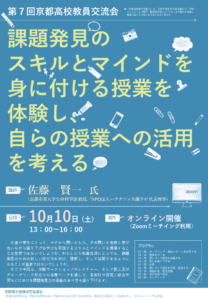
Isn’t it important for students and students to acquire the skills and mindset to practice learning to ask their own questions and delve into those questions while learning from others? I think it is important for us as teachers to be able to learn, understand, and use new ways of learning to identify issues.
Therefore, this time, through hands-on workshops, lectures, and various types of work in the form of individual and group work, we will delve into how to cultivate the ability to identify issues in each subject and in inquiry/comprehensive learning.
We look forward to your active participation.
* The 7th Kyoto High School Teacher Exchange Meeting Flyer [Download]
| Date & Time | Saturday, October 10, 2020 13:00~16:00 (Reception 12:45~) |
| Place: | Online (Zoom Meeting) |
| theme | “Experience a class that acquires the skills and mindset to identify problems, and think about how to use it in your own classes.” |
| coordinator | Kenichi Sato (Professor, Faculty of Life Sciences, Kyoto Sangyo University / Representative Director, NPO Hatenathon Co-Creation Lab) |
| Composition |
13:00 Opening Objectives and Goals |
| Participation Fee | free |
| Target | High School Teacher * People from outside Kyoto Prefecture can also participate. * We will have a breakout session (group work), so those who can turn on video and audio and participate. * Those who can participate in a quiet environment where they can speak. |
| Occupancy | First 50 people |
How to apply
Please use the method (1) or (2) below to fill in the required information (including pre-assignments) and apply.
* Pre-assignments will be distributed to applicants in advance and will be used for group work on the day.
* Applicants will be notified of their Zoom meeting ID and password around 11:00 on the day of the meeting.
(1) WEB application
Please use the application form at the following URL.
https://forms.gle/H6fCEyHhCajUgRM99
(2) E-mail/Fax application
Please download the application form below (1st sheet: application form, 2nd sheet: pre-assignment) and send it to the University Consortium Kyoto Secretariat by e-mail or fax.
◆ The 7th Kyoto High School Teacher Exchange Meeting Participation Application Form [Download]
FAX:075-353-9101
E-mail: kodai■consortium.or.jp (Please replace ■ with @)
Application Deadline
Thursday, October 1, 2020
Inquiries
University Consortium Kyoto, Educational Development Division, High School-University Collaboration Project
Tel: 075-353-9153 FAX: 075-353-9101
〒600-8216 Shimogyo-ku, Kyoto-shi, Nishitoin-dori, Shiokoji, Shimo-ku, Kyoto, Campus Plaza Kyoto
* Reception hours: Tuesday ~ Saturday 9:00 ~ 17:00 (excluding year-end and New Year holidays)
Call for Participation in 2020 Faculty and Staff Skill Improvement Training (Second Half: 4th ~ 7th)
This year, there will be a total of 7 sessions!
Second half: We are looking for participants for the 4th ~ 7th online course!
Application deadline is Monday, August 17th!
→ deadline for the 6th “Email Training (Beginner)” has been extended until Thursday, September 3rd.
* At the time of announcing the first half of the skill improvement training, the second half was scheduled to be a face-to-face course, but in view of the spread of the new coronavirus infection, the second half will also be held as an online course.
Thank you for your understanding.
Business Overview
As the globalization of higher education accelerates, such as the enhancement of support for international students and the promotion of collaborative projects with overseas universities, the English proficiency of university faculty and staff has become indispensable as a basic ability.
In addition, international students from many countries and regions have their own cultural backgrounds, and in order to communicate smoothly, it is essential to understand customs, social norms, religions, etc. beyond language.
For this reason, the University Consortium Kyoto aims to raise the level of practical skills and motivate students to improve their skills by providing training to improve English proficiency by conducting case studies in various situations and training to learn about cultures outside of English-speaking countries.
Outline of the event
* This is an online course using ZOOM.
Session 4: Saturday, September 5, 2020Business English Literacy: Intercultural Understanding and Communication in English at University (English Level: Intermediate ~ Advanced)
Lecturer: Ms.
Mikako Nishikawa, Kyoto University Session 5 September 19, 2020 (Sat) Cross-Cultural Communication for Accepting Overseas Students (Regardless of Language Level) NEW
Lecturer: Ms.
Hangarda Priyahita 6th Session September 26, 2020 (Sat) Email Training Beginner (English Level: Beginner)
Lecturer: Mr. Owen Mark Kozlowski
Session 7: Saturday, October 3, 2020 Email Training Intermediate ~ Advanced (English Level: Intermediate ~ Advanced) NEW
Lecturer: Mr. Owen Mark Kozlowski
☆ For details such as training content, hours, capacity, etc., and the application form, please check the following page.
>>2020 Faculty and Staff Skill Improvement Training (4th~7th) Details Page
* Please note that if there are many applicants, a lottery will be held.
* The decision on whether or not to attend will be announced at once in mid~late August after the application deadline.
< Contact>
University Consortium Kyoto, International Business Department
TEL:(075)353-9164 / FAX:(075)353-9101
e-mail: kokusai■consortium.or.jp (Please replace ■ with @)
【For University Faculty and Staff】Call for Participants for the 25th Kansai Disability Student Support Roundtable (KSSK)
The Kansai Roundtable of Persons in Charge of Support for Students with Disabilities (KSSK) is a roundtable meeting of practitioners to engage in lively discussions, exchange opinions and information, and build networks on various themes related to support for students with disabilities based on the basic principle of a practitioner’s perspective.
◆Date & Time: Friday, September 4, 2020 14:00~17:15 (Reception starts at 13:00)
◆ Venue: Streaming discussion via Zoom
◆Target: Faculty and staff who are involved in or interested in supporting students with disabilities at universities and junior colleges in the Kansai area
◆ Capacity: 50 people (first-come, first-served basis)
◆ Participation fee: Free
◆ Application form: Click here to apply.
【Application Period】July 21, 2020 (Tue) ~ August 11, 2020 (Tue) *Closed as soon as the capacity is reached
Applications are now closed.
Contents and Schedule
| 13:00 | Reception starts |
| 14:00 | Opening Remarks |
| 14:10 |
Plenary Session (1) ≪ Lecturer≫ ≪ Contents≫ |
| 14:40 | Rest & Movement |
| 14:55 |
Breakout Sessions Due to the spread of the new coronavirus infection, each university has been offering online lectures and other events for people with disabilities. |
|
A Reasonable Accommodations for Online Lectures Capacity: 20 people C. Support for university events and student life Capacity: 15 people |
|
| 16:25 | Rest & Movement |
| 16:35 | Plenary Session (2) Conclusion |
| 17:15 | closing |
◆ Application note: Please be sure to check the following.
< Participation in the subcommittee>
Please select your preferred ranking in subcommittees A~C up to your second choice. Please note that it is on a first-come, first-served basis, so we may not be able to meet your request.
Note 1: In order to reflect the topics to be handled in the subcommittee, we will discuss the problems and issues at your own university.
Please fill in the application form with the topics you would like to be covered.
Example: Points to keep in mind when conducting online consultation on mental health
Note 2: Please include the number of students at your university and whether or not there is a support system (if so, the number of department members).
Note 3: If the capacity is exceeded, priority will be given to those who are first served. The URL of the subcommittee in which you will participate is open.
It will be included in the email sent around 7 days before the event.
* If you cannot send the participation application form, we will respond by e-mail separately, so please contact us to that effect.
Please contact us.
* The personal information you receive will be used only for purposes related to the operation of KSSK. In addition, for the operation of the subcommittee,
Please note that members of the Board of Directors may contact you separately.
< What to prepare before participating>
Please prepare the following for the online event.
・ Environment connected to the Internet
・Please have the Zoom application installed.
・Please set the name displayed on the Zoom screen to “Name (full name) of your university or junior college”.
【Organizer and Planning】
Organizer: University Consortium Kyoto
Planning and management: Executive Committee of the Kansai Association of Persons in Charge of Student Support for Students with Disabilities
Inquiries
University Consortium Kyoto Student Support Division
Reception hours: Tuesday ~ Saturday 9:00 ~ 17:00
〒600-8216 Shimogyo-ku, Kyoto-shi, Nishitoin-dori, Shiokoji, Shimo-ku, Kyoto, Campus Plaza Kyoto
TEL:075-353-9189 FAX:075-353-9101














